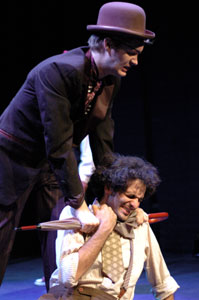SITE GUIDE
REVIEWS
FEATURES
NEWS
Etcetera and
Short Term Listings
LISTINGS
Broadway
Off-Broadway
NYC Restaurants
BOOKS and CDs
OTHER PLACES
Berkshires
London
California
DC
Philadelphia
Elsewhere
QUOTES
On TKTS
PLAYWRIGHTS' ALBUMS
LETTERS TO EDITOR
FILM
LINKS
MISCELLANEOUS
Free Updates
Masthead
Writing for Us
A CurtainUp Review
Marco Millions (based on lies)
| There's no money in politics, dear Uncle. And no power. The power comes from Money. …They say, he Who's got the gold makes the rules, but I submit: He who makes the rules gets the gold! --- Marco Polo . |

Kevin Townley and Arian Moyaed
in a scene from Marco Millions (based on lies).
|
Waterwell is known for its clever playing with traditional theatrical boundaries, and such characteristics are quickly in evidence here. Marco Millions opens with a kind of vaudevillian soft-shoe act in which the narrator Kevin Townley (playing himself) explains the details of what the audience is about to see in appropriately Barnum-esque prose, introducing each of the characters (using their respective performers' real names to do so) before launching into O'Neill's text.
By the performers' own admission (despite the listing of Tom Ridgely as director, Waterwell prefers to think of itself as a largely collaborative exercise without any individual artistic authority), their use of the text is fast and loose, and so the show tends to veer wildly from historical account to thinly veiled modern commentary on our consumer culture and back again without prior warning. The staging itself is similarly disjointed--the Lion's physical setup, with the audience seats set back from the stage while the "pit" orchestra plays from a ledge above the action, contributes to this feel. At times this confusion works, in part because the cast of five (Hanna Cheek, Rodney Gardiner, Arian Moayed, Ridgely and Townley) is quite good and can often sell a given scene despite its oddities. And the music (composed by Lauren Cregor) gives a kind of resonance to the on-stage action which is both moving and surprising.
When at its best, this free-wheeling approach gives O'Neill's dialogue (never one of his strengths) a freshness and vitality which is appealing and effective. It's clear that the performers have bought in to Waterwell's vision of collaborative artistic achievement. But as the production continues, the drawbacks of this method become increasingly obvious. Despite its intelligence, the adaptation at times seems too clever by half and after a while the audience starts to wonder if it's being left out of an inside joke which only Waterwell insiders truly get.
Playing the Khan as a Mafia don seems like a reasonable extrapolation of O'Neill. Less easy to understand is how an impromptu poetry slam featuring sailors and the Khan's suffering daughter fits in, or why the Khan elects to break into a heartfelt but bewildering Negro spiritual towards the end of the play. At other times, O'Neill's own tendency to moralize gets gleefully amplified, so that the potentially fascinating return of Marco Polo to his Venetian home is marred by the obvious hammer-satire of a song (and scene) composed entirely of the word "money." The musical numbers don't work, in part because despite the quality of the composition, the orchestra is noticeably sub-par. As an Australian friend who was with me observed, during times like these the play feels more like ""a university exercise" than a theater production.
Despite the problems mentioned, the elemental power in all of O'Neill's work comes through often enough, with Polo's speech to the Khan about his invention of money particularly well done. But these good moments are undermined by odd decisions and directorial misjudgments. An adaptation of Marco Millions (based on lies) needs to overcome its natural failings; instead Waterwell tends to play into and enhance them, and the result is an erratic and rather disappointing production.
Editor's Note: For more about Eugene O'Neill's work and life and links to reviews of O'Neill play's reviewed, see our O'Neill Backgrounder.
|
MARCO MILLIONS (based on lies) Playwright: Eugene O' Neill Adapted by Waterwell Director: Tom Ridgely Composer: Lauren Cregor Choreographer: Lynn Peterson Cast: Hanna Cheek, Rodney Gardiner, Aria Moayed, Tom Ridgely, Kevin Townley Lighting Designer: Stacey Boggs Costume Designer: Elizabeth Payne Set Designer: Dave Lombard Sound Designer: Jessica Paz Musicians: Lauren Cregor, Gunter Gruner, Jenny Hill, Adam Levine, Joe Morse Running time: 1 hour, 25 minutes (no intermission) The Lion at Theatre Row, 410 W. 42nd St., 212-279-4200 Web Site: www.waterwell.org From 8/4/06 through 8/26/06; opening 8/12/06 Mon, Wed.-Sat. @ 8 p.m. Tickets: $35 for all performances Reviewed by Gregory Wilson based on August 10th press performance |
The Internet Theatre Bookshop "Virtually Every Play in the World" --even out of print plays

Easy-on-the budget super gift for yourself and your musical loving friends. Tons of gorgeous pictures.
Leonard Maltin's 2005 Movie Guide

6, 500 Comparative Phrases including 800 Shakespearean Metaphors by our editor.
Click image to buy.
Go here for details and larger image.








